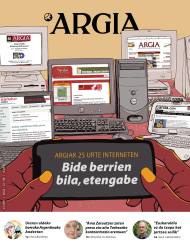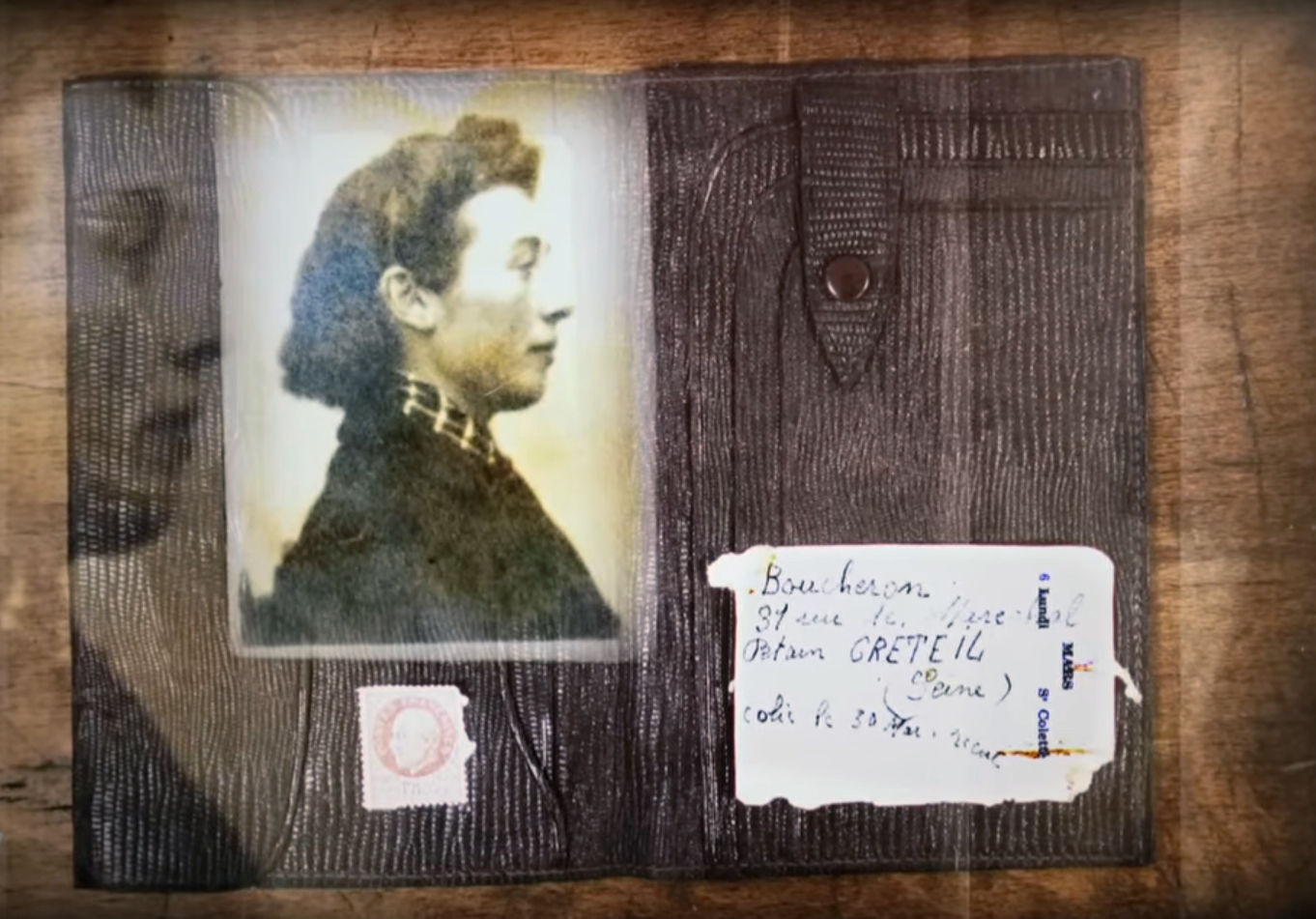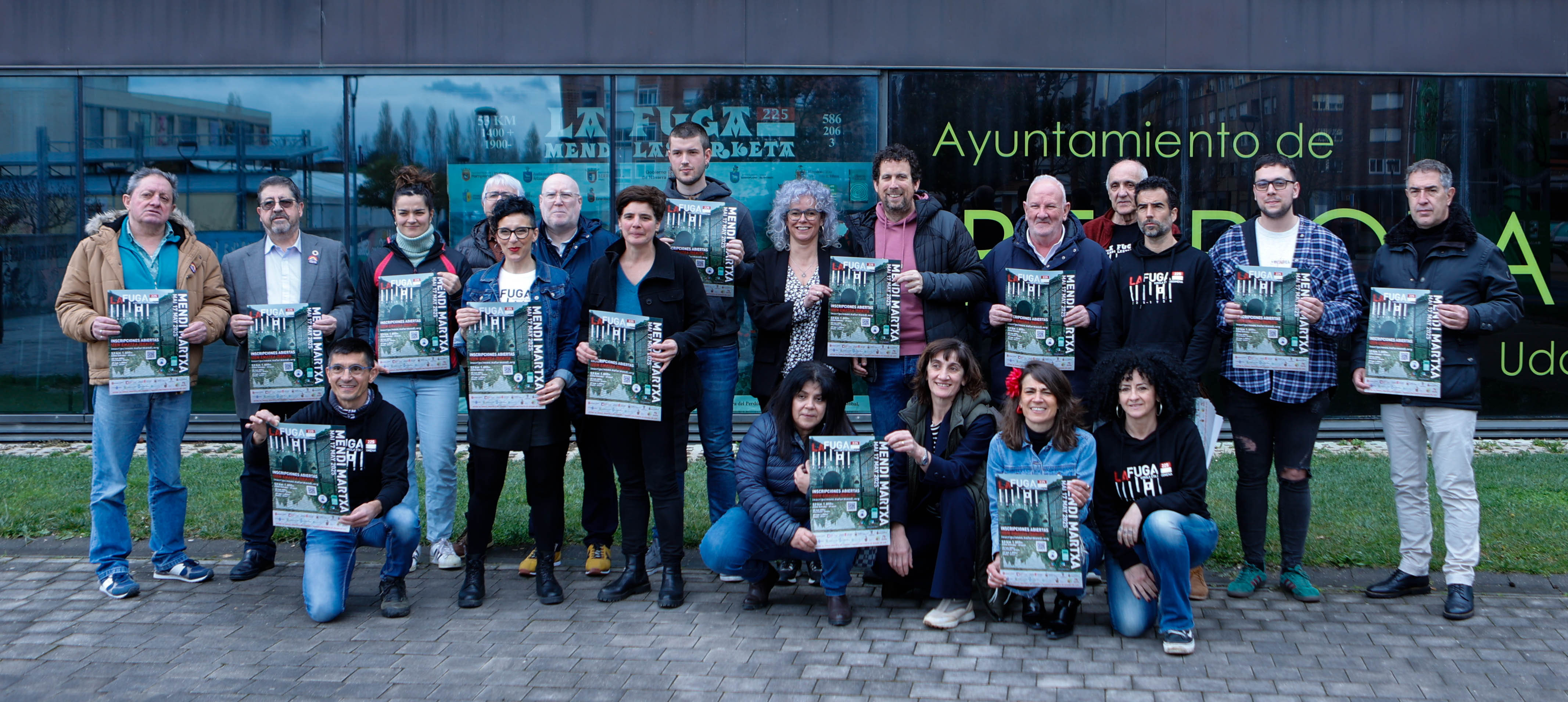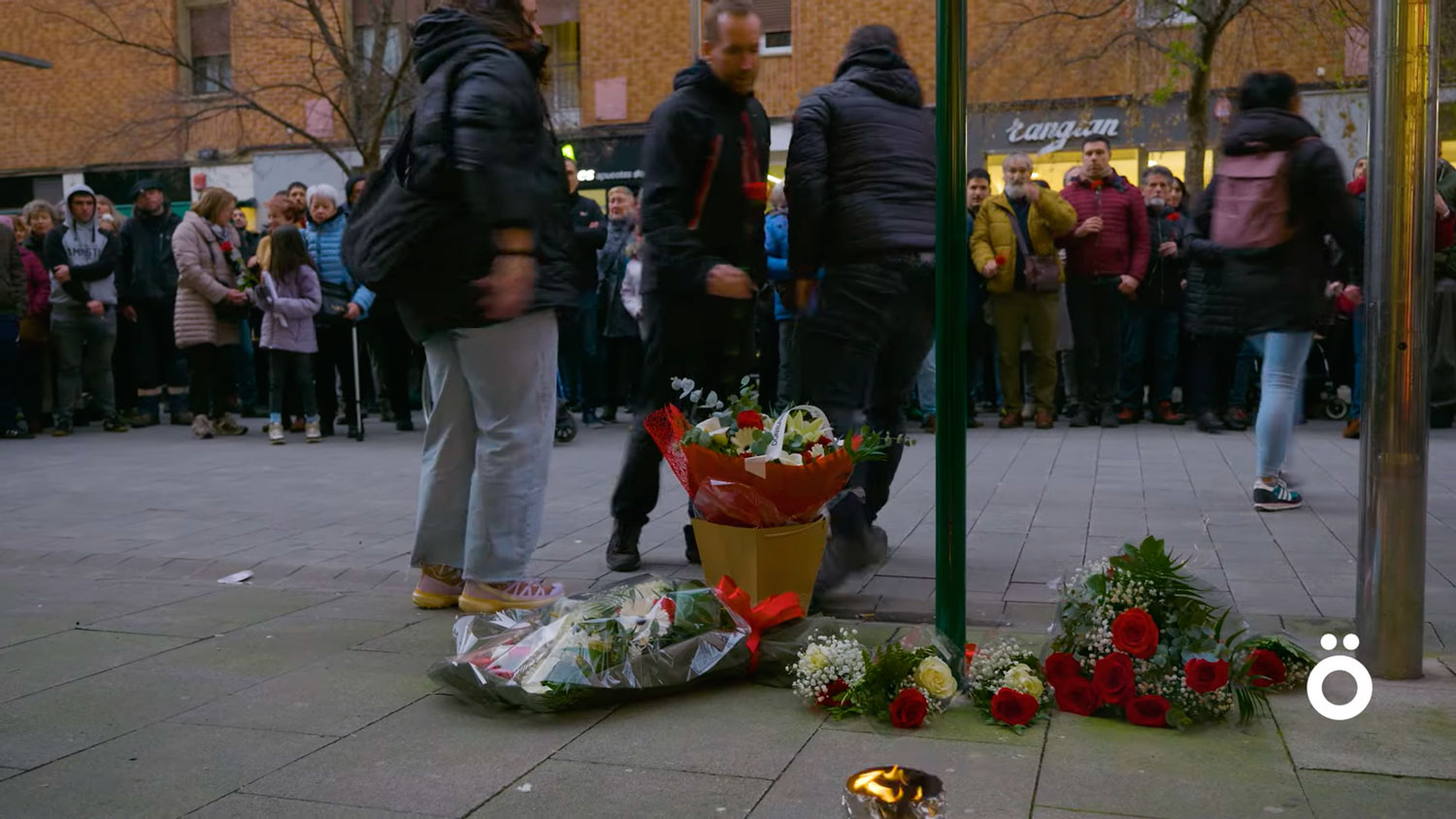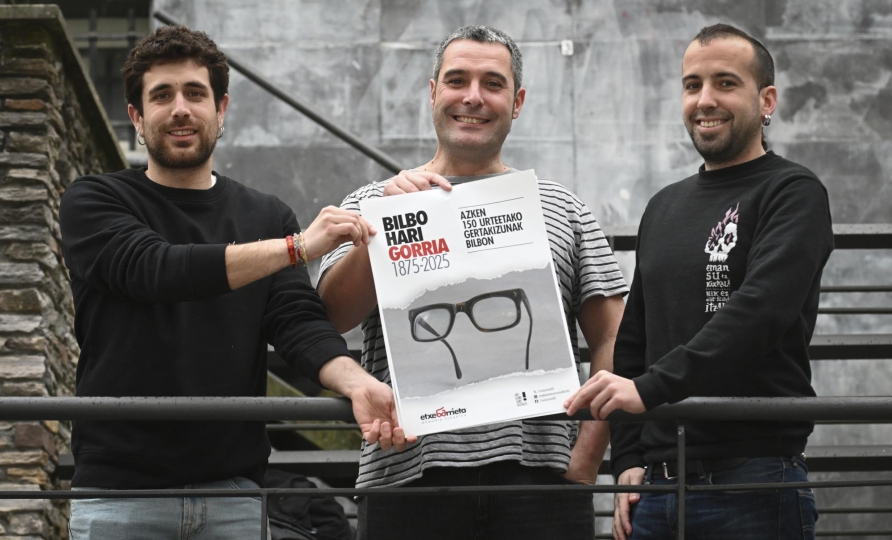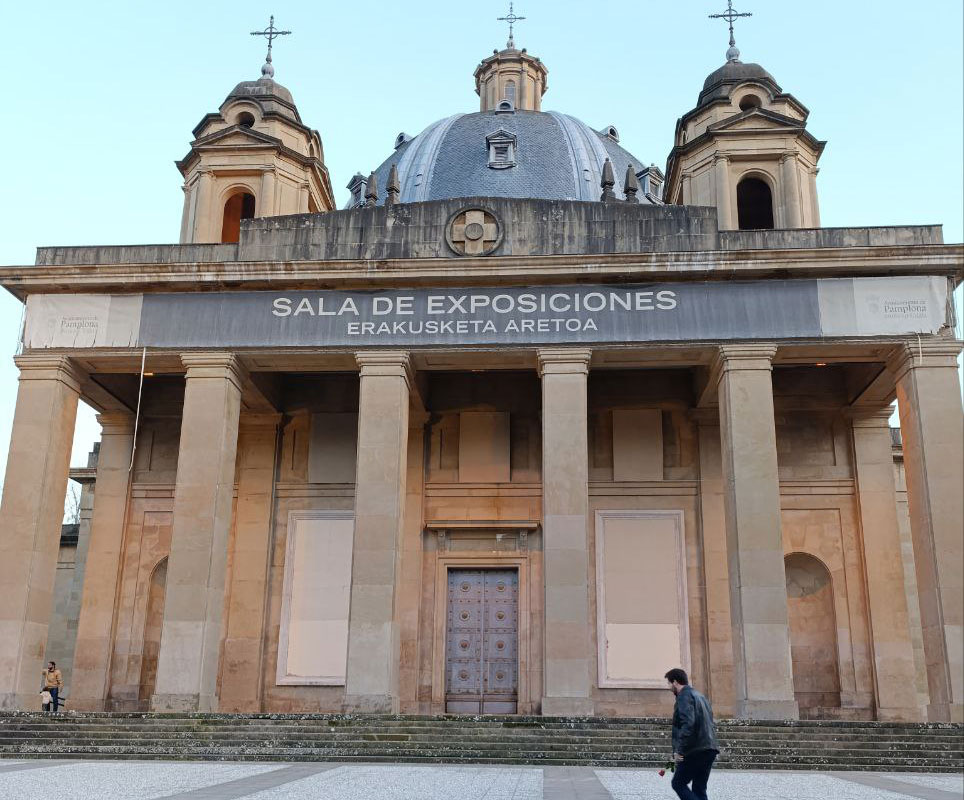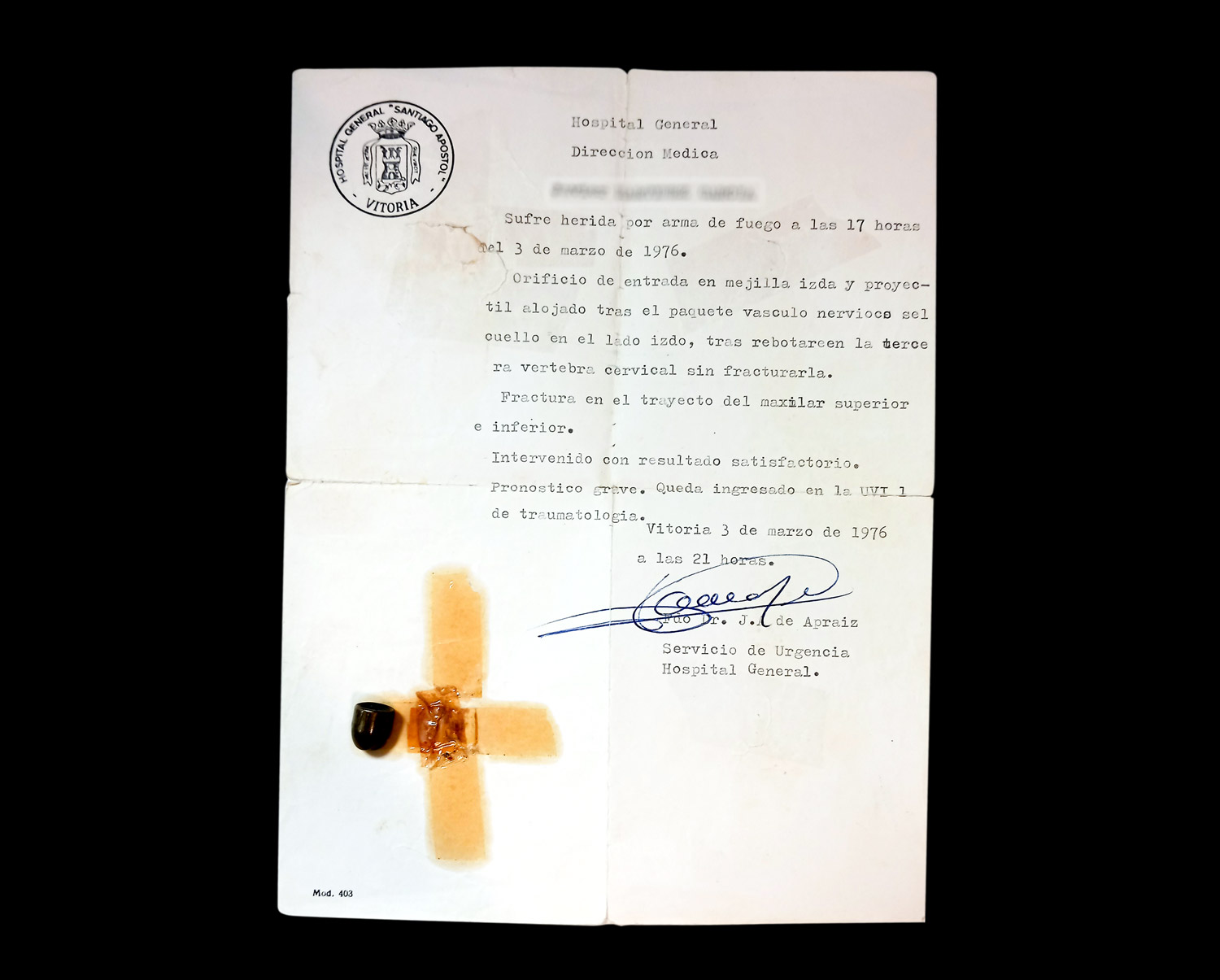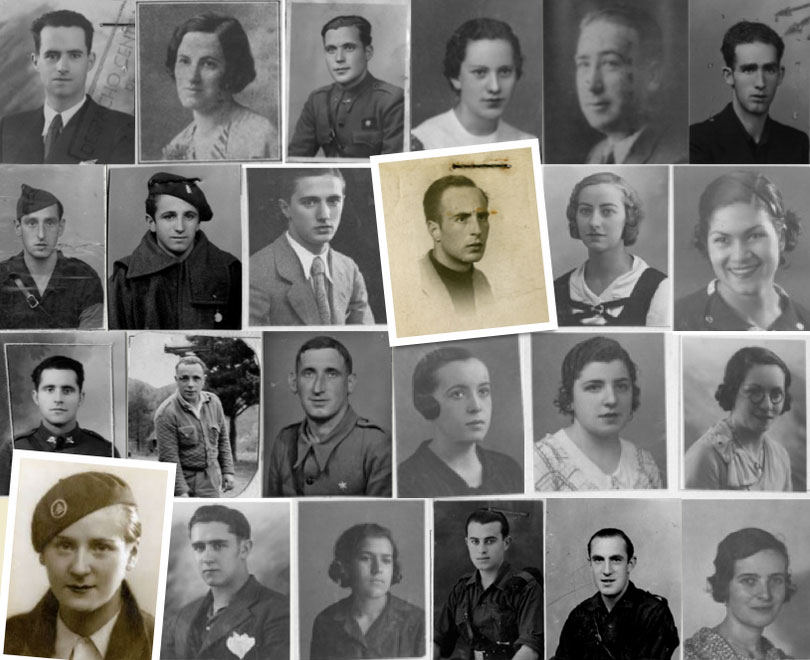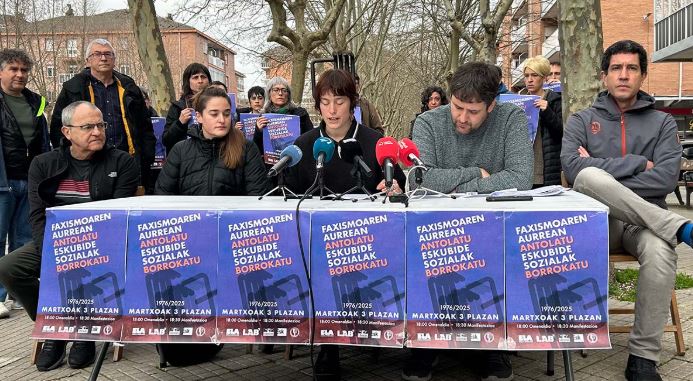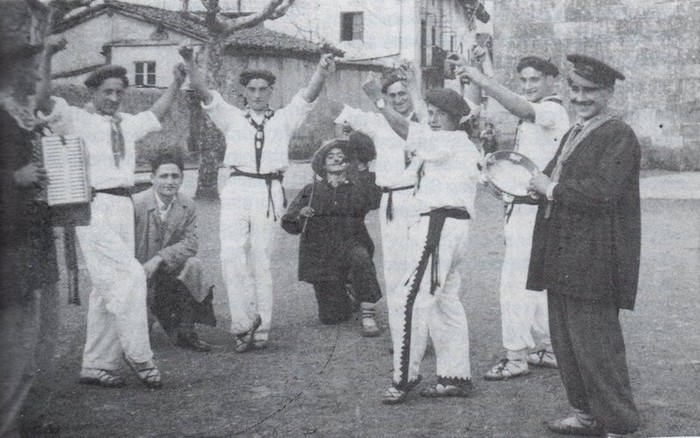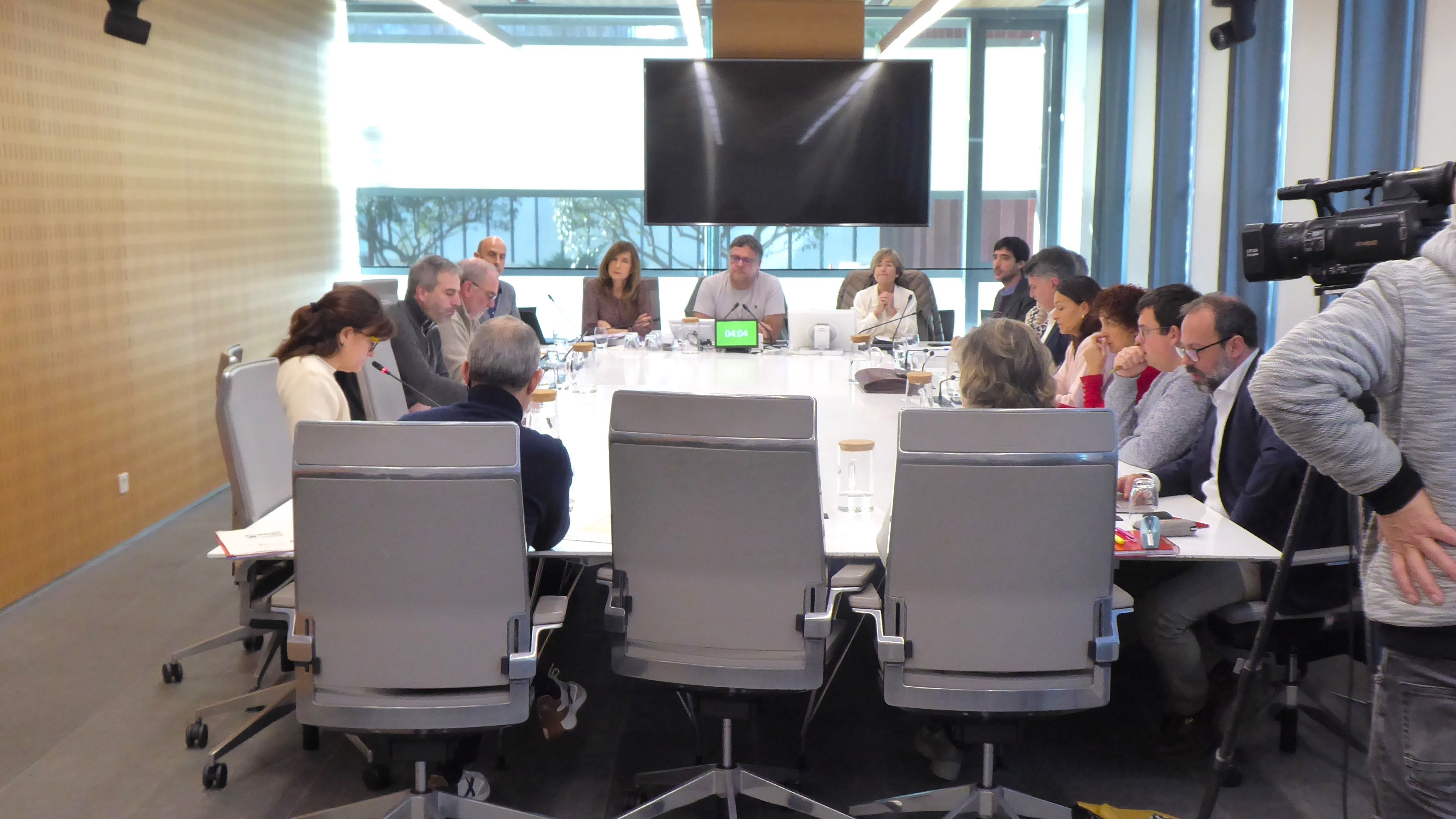"I don't know where we were getting our strength to move forward."
- Your life has not been easy. They were nationalists at home and were captured by the Spanish Civil War of 1936. They fled from there and from here to there. Once again, for good reasons, Begoña Olabeaga was sent to Belgium. There, during World War II. Fleeing from there, lived Franco’s dictatorship, fled his life suddenly.
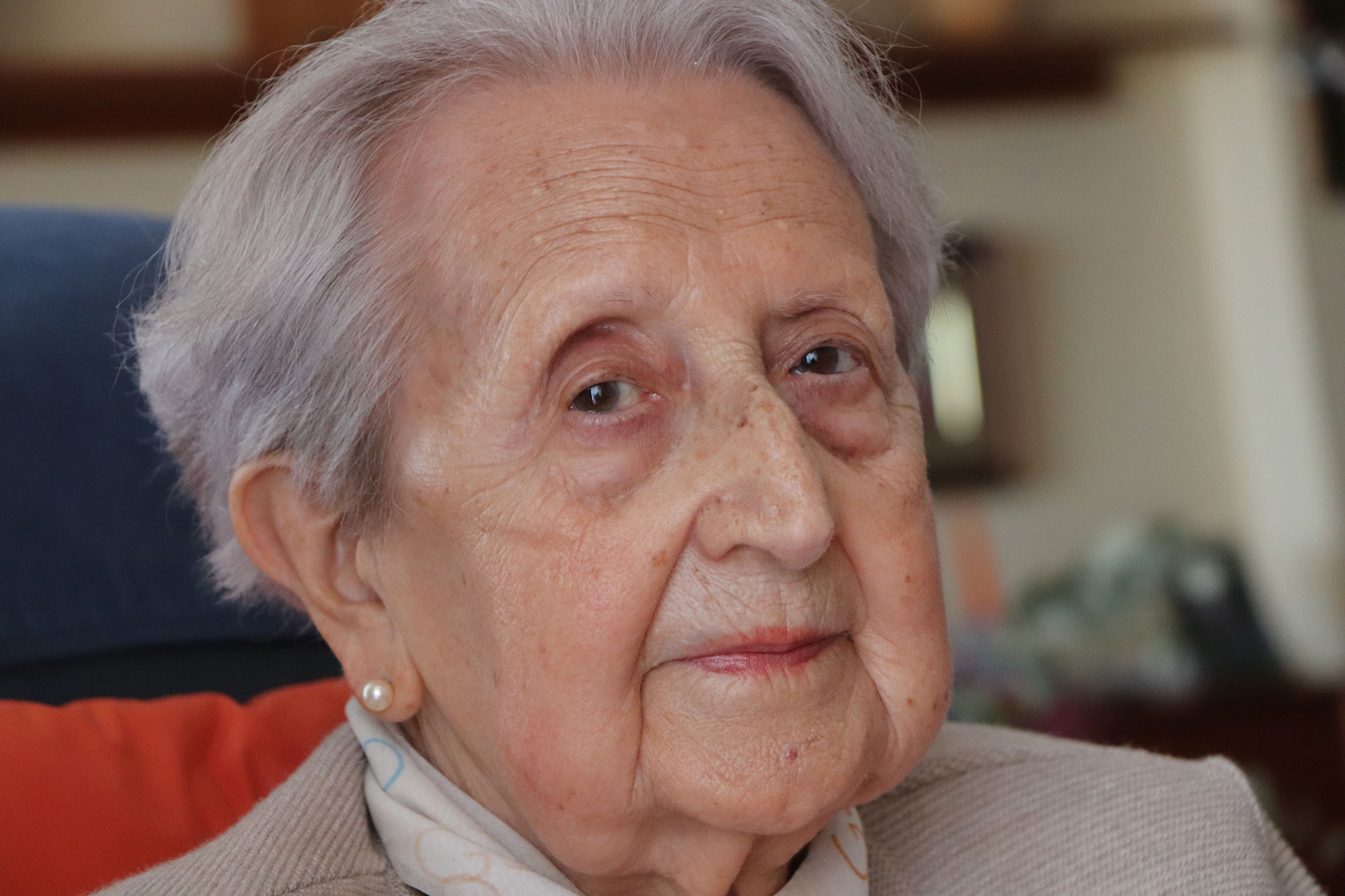
Begoña Olabeaga Basurko. Zumaia, 1927
A century of full history. First lived the Spanish Civil War of 1936 and the subsequent repression. the exile of San Juan de Luz and the Belgian exile, as children of different wars. There he played World War II. Return to San Sebastian, the dictatorship of Franco. He grew up in the ikastolas of Elbira Zipitria and Faustina Carril. He knew the beginning of St. Thomas Lizeo. "It hasn't been easy, no," he continues.
We were 95 years old on August 23… I didn’t think it was going to last as long. What has happened and then! Two wars, of course… so many things! I was born in Zumaia, where my father
was the director of the Guipuzkoan bank. Then he was appointed head of the Zarautz office and we went to live there. Time of war caught us in Zarautz. Our mother was from Mutriku, and our older sister, Itziar, was born. The second son, Joseba, in San Sebastian, along with Iñaki and Arantxa, in Deba… I, the youngest, in Zumaia… My father went from office to office, from town to town, which was born in San Sebastian, but on Kanpanario Street.
He was born in Zumaia in 1927, then he was in Zarautz… But he preferred Zumaia
and my father too. We had more acquaintances in Zumaia, Mr. Vicar, doctor, friends… We went to Zarautz before the war and they told us that we were nationalists, they didn’t see us well. Then, in times of war, before the nationals entered Zarautz, they sent our father to go to Bilbao, bring money, in 1936. And to me, on Zarautz Street, I remember the kids saying, "Your father, the thief!" That is it! You've heard at home. His father was well known in our village, Patxi Olabeaga.
The
director of the bank, as you said. Yes, and in summer the Madrid people came to Zarautz, and for the money they were related to our father. Now where the Argiñano restaurant is, the Marquis of Burgueto lived, and I remember that my brother Joseba and his girlfriend went home to return their jewelry and money. And then we told ourselves we were thieves in the village. And I am ashamed! He was then nine years old. The war came and his father was transferred to Bilbao. Our brother Iñaki went to Mutriku and from there to San Juan de Luz, by boat, because our mother's family had boats in Mutriku. They were called “de la Txanbelena.” So many passed to Donibane [Lohizune]. By then, we had a guy in Donibane, who had gone before the war, and at home he took several people from Mutriku. The house that was called Usotegia had two dwellings and a loft, and those who went around slept there, because there was no other place on the ground. And to eat bad. We passed those of Christ.
From Zarautz to San Juan de Luz. Yes, but after a long journey. The other brother, Joseba, was in politics and hid himself first in a
hamlet of Itziar, but then passed to the other side, in the mountains. We also went down the mountain, went to Elizondo and to Urdazubi. When the war broke out, Mom and three sisters stayed in Zarautz, but the mother was arrested, she was imprisoned in the convent of clairvoyants for nine months. Twenty women were arrested. Because they were nationalists! When my mother left jail, we left Zarautz.
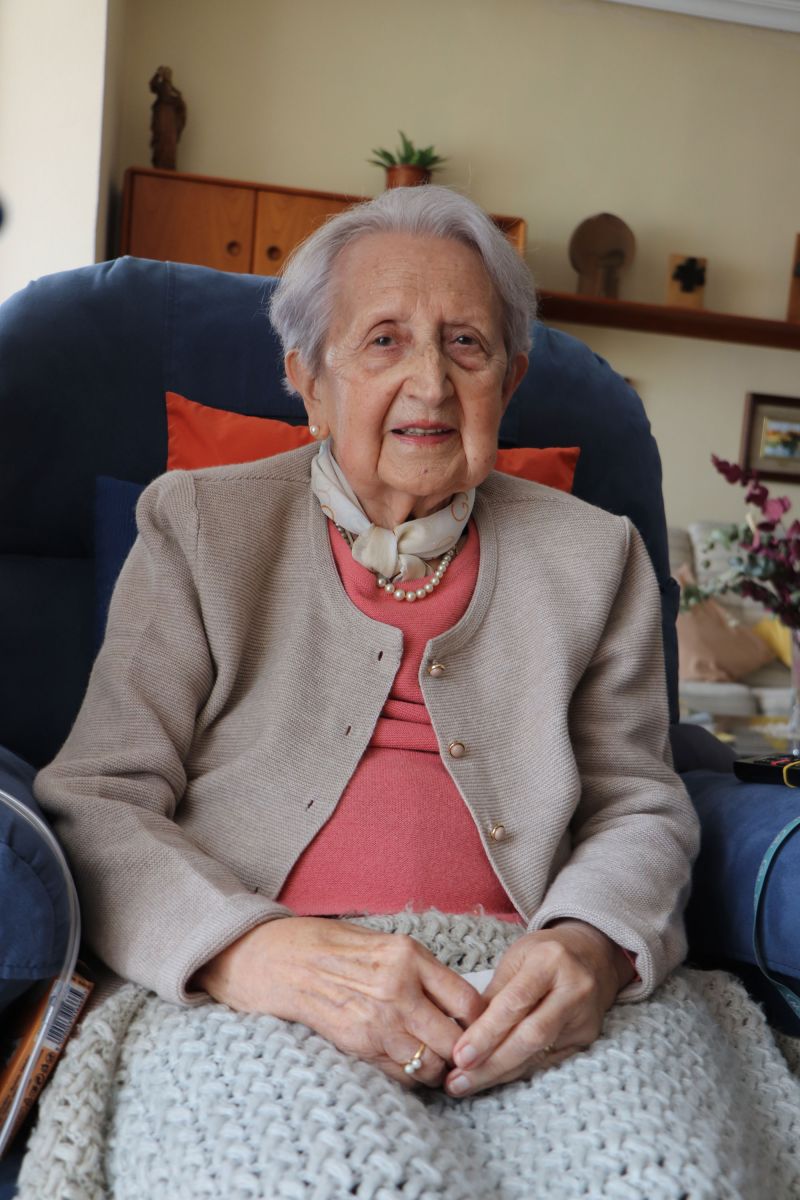
How were you, how were the three sisters, while they had their mother prisoner? The older sister, Itziar, took care of us. It was eleven years older than me. Itziar's hair was cut off. He was not cut off like
that from anyone in Zarautz!
I went to school, the nuns, but they closed it, and I had to go to public school. At noon we were going to bring the food to the mother. The other sister, Arantxa, who was young, was seventeen years old or older, went to the Falangists' houses for cleaning. We lived in the plaza, there the Banco Guipuzcoano, there the kiosk, and every time the Falangists and the Requetés entered a village they celebrated the festival. They wanted to take our sister Itziar to one of those parties to prove it, but through the village doctor, I think it was from Aroz, we managed not to do it.
What do you mean you wanted to show your sister in Itziar Square? They cut her hair! And that's what Falangists and Requetés want to show! His hair was cut off very well and he wore a scarf over his head. We also tried to buy a wig, but we did not surround ourselves anywhere, neither in San Sebastian nor anywhere, and our lady Itziar was clothed with crab until her hair grew. The phalangists and burning stones that made so much noise in the plaza, at the end we went to
a hamlet of Aizarnazabal, home to some acquaintances. And when we were there, we received the warning that if we didn't go back to Zarautz's house, we would be left with nothing, that the Falangists and the Requetés entered our house and began to throw out the window through the furniture. The house was handed over by the bank to our father, the first floor, and the owner lived on the second, or even her, and all against us.
How long? Until her mother was released. They came out of the convent jail and called the general command, the palace of Narros, and asked him where he wanted to go. That my mother wanted to go home with her daughters, but in command no, that she needed it outside the village, away, or to Zaragoza
or to Pamplona. And the mother chose to go to Pamplona, because in our house of Zarautz, because in the third one lived the painter Ugarte, who told us he had cousins in Pamplona and he would give us a letter to go home, which would help us.
And from Zarautz to Pamplona you...
We left jail Bai.Ama at 16:30 and soon took the train and went to Lasarte with our mother. In Lasarte take the train of the Plazaola and reach Pamplona. We arrived at 9 p.m., we didn't know the city, but we asked one, we asked the other, we arrived at the house Ugarte said. I remember being in Casco Viejo, San Antón Street. “Where do you come from?” they asked us, and I, in Spanish: “They have driven us out of Zarautz!”… We did the night at the house of the cousins of Ugarte. They were a childless marriage, they were Eratsun's lady who knew Euskera. The next morning we started looking for accommodation. In the first accommodation they wanted to charge each one 14 pesetas a day, but we didn't have that much money. However, our mother was treating, her family had in Mutriku a bar and a grocery store she knew in the deal. And we surrounded a home on Merchants Street: a room with permission to use the kitchen. There we go.
How could they make progress in Pamplona? Her older sister knew how to sew and started working on it. The second, in
a house, was going to be done for cleaning. I went to school. Sure in Spanish, but I already knew how to speak in Spanish. And the teacher came to my feet and asked me where we were coming from, and I told her everything, starting and ending -- I think the teacher was called Menaia -- and she brought us to Emakume Abertzale Batza, and they brought us to eat and take me to the mountain on Sundays -- those women behaved very well with us. It was another, Anjel Irigarai, who also helped us a lot. We were on a fifth floor, and when the planes came, we had to go down to the basement, and once the sister fell and broke her leg. And he came to Irigarai to heal his sister. It was in 1937.
Look, the great physician and vasophile Aingeru Irigarai. Yes, and in Pamplona
we were fine, at least if we didn't get into the salsa. However, the lady in the house in which we lived told us that please do not speak Basque, as in another room there were civil guards, staying. At that time, one day came a man dressed in cottage cheese, Elizondo. It came from our father. Our father had already gone from Bilbao to Barcelona and from there, through France, to San Juan de Luz. There he talked to him about Elizondo, a smuggler, and he came to us. It was June. “Don’t say anything to anyone. Take the pouch and put as much clothing as possible. Tomorrow I’ll come and find him with the taxi.” And so on. San Antonio is celebrated in June, on the 13th, when there will be some. That man came and we went to Elizondo. There we slept, in a beautiful house, very Basque, and the next day, in the first hour of the morning, we went to Urdazubi.
You went to the other side ...
And when the civil guards at Urdazubi asked us where we were going, we told them we were going to the mountain. And instead of taking directly to France, we took a trail to the left, and there we get a girl. “Keep this girl silent. He will lead you to France,” our guide told us. We walked a lot. It made a good atmosphere, but hot, dressed all! And sister Itziar, still with standing pain, was not completely cured. And in a creek he fell. “Mom, leave me here,” she said. And mothers: “No, Itziar, though I drag you, I will take you.” And we took it together. He wasn't a forest, he was a mountain, and we had to shut up.
When we got up at noon, there was a hamlet. There we knew our father was waiting, but as we delayed, he went back. My mother began the cloak to “Gora Euskadi!” and all the way down was reclaiming the rosary for help to the Sacred Heart. One day we got to another house, we called my father Donibane and he came to us. And what we were welcomed into Donibane!… I have never returned to those places. They're bad memories, you know. My husband also told me once, if we were going to go to those places, but I didn't, I didn't even want to remember. And so on.
"When the war broke out, mom and three sisters stayed in Zarautz, but the mother was arrested, imprisoned in the convent of clairvoyants for nine months. Twenty women were arrested. Because they were nationalists!"
And when you came to San Juan
de Luz what? We live in our uncle's house. It was a bathroom! All Basques! The truth is that Donibane was full of Basques, full of refugees. At that time, a lot was being done in Basque in Donibane, and we worked in Basque. I started school, I started a nunnery school, but I had to pay for some and devalue others. Those who paid were dressed in uniform and the others in town. There was a wall between them. In the time of Lent, the nuns smelled us, let us see if we ate meat! Then the mother took a room in Donibane, with permission to use the kitchen, was Rue Tourasse, I remember. I at school stitched my older sister and another at Getaria working at a hotel.
Did the father also have you? No, his father
was run over and kept in Tarbes, in a concentration camp. The train rails were placed alongside many others. He was in the Pyrenees, in the blackest cold. A priest from Mutriku came to Donibane, José Antonio Usobiaga, and said to our mother, “I have three sisters, who take me and I go to Belgium. What is not your little one with us?” Me. Our mothers who don't: "We're going to fix." And Usobiaga: “But there he will eat well and receive education, he will learn French…” And he warmed his head, and Belgium I!
You mean Usobiaga and her three sisters? Yes. Train from Paris to Brussels. There they took me to a school: how the animals are sold at the fair, so I -- it wasn't just me, of course, there were more girls and boys -- on a stage. The people they called, to see who had the will to welcome us at home. I took a canon priest named Hermann Frater and took me to Malinas. This was the district of the Archbishop of Flanders, where they spoke, without French, of Flemish. The capital was Antwerpen [Antberes]. Their bishops, Van Roey and the priests, constituted the children's association of the Basque Country. Reds and Republicans moved elsewhere. You, as you said, Malinas. And there I was. I was very thin and very smart, not eating. In Malinas, I lived in the village of Herentals. Next to him, another small village, Poelkapelle, always in Flanders, I went to school there, and I immediately learned the Flanders and forgot Basque and Spanish.
Forget? When you can't talk to anyone, you do it the way you forget. I didn't know how to write in Spanish or Basque, I wrote a
letter to my house, but nothing else. In Donostia-San Sebastián, the Ponsol Dinghies formerly existed. It is the oldest store in San Sebastian, located on Narrika Street, on the corner of Sarriegi Square. Her daughter, Karmele Leclercq, was going to visit her or send someone to Antwerpen, monitor, to see how the kids here were, but we were fine.
How long were you there? Until the advent of World War II, the war began in 1939, until my mother claimed me, to be brought home, she didn't want
me to be there anymore. And I came back: Hermann Frater himself brought me to Donibane. We left home fleeing war, but then we returned to Donibane fleeing war. And when I got home, my mother said, "What? Don't you know Basque or Spanish? Only in Flanders?” But, of course, I immediately started again: at home there was nothing but Basque, and at school, in French. Hermann Frater put me in French school, but among those who paid, along with those who wore uniform.
"His father was captured and kept in Tarbes, in a concentration camp. The train rails were placed alongside many others. It was in the Pyrenees, the blackest cold."
You were beaten by the war in Spain, the Second World War… I don’t know where we were getting the force to move forward. And today they are still at war [Ukraine]. How is it
possible that the person today, so many advances and inventions, so many sciences and vaccines, so many Mars and the planet, and how is it possible!... What do you want to know more? I told you a lot, right? !
How did you meet your husband, José Antonio Zaldua?
There's the story of my brother Iñaki. He worked in Bordeaux and was transferred from Marseille to Algiers, in those large wine trucks, and he worked in Algiers. He was not twenty-five years old either. One day he was taken to Melilla and arrested, and in Algeciras he had the man in the concentration camp. He became ill, was transferred to the hospital in Seville and was sent to his home for incapacity, alleging cardiac disease. For having run over some rheumatism. But at that time they always said it was rheumatism. And so Iñaki, sick, was sent home to San Sebastian. Here he started working at Cementos Rezola, through a friend or acquaintance. And in that he gave him the thrombosis and he had half a body. The poor man spent nine months in a house lying in bed and died at the age of 27. And I was a cyclist, a swimmer, a painter -- I knew how to do everything, it was very fast.
And how I met our man… At that time, when someone was about to die, the priest came home to take a look at the sick, and when the priest came to our house to give the boat to Iñaki, my husband followed him on Getaria Street 13.eraino to the house where we lived. José Antonio learned that my brother died and since then almost every day we had a Mass in the Cathedral of the Good Shepherd. Hence our knowledge emerged.
José Antonio Zaldua was president of the Federation of Ikastolas de Gipuzkoa and member of the Basque Parliament and secretary of the bureau, who participated in the creation of the Holy Thomas Lyceum. Your children were also students of Elbira Zipitria…
That's what we wanted, but Elbira had no place, and our kids learned with Faustina Lane. Elbira had no more than seven children sitting on the floor at home. He couldn't take more children and Faustina was very nice. Izaskun and Xabier, for example, studied with Faustina… But before Elbira Zipitria was my teacher on Fermin Calbeton Street.
How is that possible?
Yes. Before the war, when we lived in Zarautz, my two brothers had to study trade, and that had to be done in San Sebastian. Our mother took a house for the winter in San Sebastian. However, on weekends we were going to Zarautz. So I went to Elbiraga. Then, many years later; after getting married, I mean, selling the house inherited from my mother Antxon in Mutriku for 20,000 pesetas, we live in the Old Part of San Sebastian, on Fermín Calbetón Street, and lived around Elbira. Then, newborn our third son, we went to live on Once de Amara Nuevo Street, current Eustasio Amilibia Street. “What, are we going there? To live among Spaniards? There is nothing but Spanish!” And when Ez Dok Amairu came to Victoria Eugenia, "How beautiful, what beautiful, Lourdes Iriondo." And he said, "Nice? What do they have to do with the Spanish guitar! Out there!” That was the case with Elbira. Gajo!
Your husband died in a traffic accident in 1983...
When he started working in Vitoria, in the parliament, he was always there, there was no time to go home. We eventually went to Vitoria. One day he came from there to San Sebastian, to the dentist, to do his usual exam. They had to do something and they gave him anesthesia. On his return, in the car, while he slept behind, neither belt nor another, in Itziar, at the exit of the Deba tunnel the car was directed to the driver, the border that struck, turned and José Antonio was cut down on his head.
And what life has he had since?
I've been a widower for 40 years. I was healthy, luckily, and I moved on, but I don’t know where we got forces from... Most of my children were already out, I was at home with Mikel and Antonio. If my husband died, I entered the women's association, before it was Profen, now Eragin. We had talks on Tuesdays and Fridays, and then we would have coffee with milk or something and do excursions. I also went to the movies, I was very fond.
It would not be easy…
No, it hasn't been easy, but they help patience, resignation, gentlemen -- faith helps you completely! I'm a believer! But there are also concerns. “God, what, on vacation, or what?” I think sometimes, because there is nothing good: turning on the radio, turning on the television and a good thing is not heard. However, I do not see television well, I have a flute in my eye and impaired vision: I see no face, but I know the voices. I can't read. And so on.
* * * * * * *
I studied administration in French school and then started working in the hospitality cooperative. Many women worked at the time. By then Tabakalera. Before
our house there were so many women, all to work, every day! The other day my son Xabier read to me how the mother of Arantxa Urretabizkaia worked in the Nerecan store. That category! She was a very beautiful woman.”
“When I got married, period, I couldn’t keep working.
Consuelo Lasarte, another partner and three, married the same year. And you get married and you're done, you get paid and you get out on the street! José Antonio’s little sister, Pilar Primo de Rivera, ordered: ‘Andrea home, have children and take care of them!’ They didn't let us go to work. In 1955 we lived with a salary our husband and his five children. You had to live with a salary!”
Last word
Generation
"It is a generation, which goes, the one whose testimony has not been successive enough. When we have all the means and all the riches that are and are not in our hands, regardless of what we are failing to go forever."
Kirola eta oroimena uztartuko dituzte, bigarrenez, mendi-martxa baten bitartez. Ez da lehiakorra izanen, helburua beste bat delako. La Fuga izeneko mendi martxak 1938ko sarraskia gogorarazi nahi du. Ezkabako gotorlekuan hasi eta Urepelen amaituko da. Maiatzaren 17an eginen dute.
Fusilamenduak, elektrodoak eta poltsa, hobi komunak, kolpismoa, jazarpena, drogak, Galindo, umiliazioak, gerra zikina, Intxaurrondo, narkotrafikoa, estoldak, hizkuntza inposaketa, Altsasu, inpunitatea… Guardia Zibilaren lorratza iluna da Euskal Herrian, baita Espainiako... [+]
Gogora Institutuak 1936ko Gerrako biktimen inguruan egindako txostenean "erreketeak, falangistak, Kondor Legioko hegazkinlari alemaniar naziak eta faxista italiarrak" ageri direla salatu du Intxorta 1937 elkarteak, eta izen horiek kentzeko eskatu du. Maria Jesus San Jose... [+]
Familiak eskatu bezala, aurten Angel oroitzeko ekitaldia lore-eskaintza txiki bat izan da, Martin Azpilikueta kalean oroitarazten duen plakaren ondoan. 21 urte geroago, Angel jada biktima-estatus ofizialarekin gogoratzen dute.
Bilbo Hari Gorria dinamikarekin ekarriko ditu gurera azken 150 urteetako Bilboko efemerideak Etxebarrieta Memoria Elkarteak. Iker Egiraun kideak xehetasunak eskaini dizkigu.
33/2013 Foru Legeari Xedapen gehigarri bat gehitu zaio datozen aldaketak gauzatu ahal izateko, eta horren bidez ahalbidetzen da “erregimen frankistaren garaipenaren gorespenezkoak gertatzen diren zati sinbolikoak erretiratzea eta kupularen barnealdeko margolanak... [+]
1976ko martxoaren 3an, Gasteizen, Poliziak ehunka tiro egin zituen asanbladan bildutako jendetzaren aurka, zabalduz eta erradikalizatuz zihoan greba mugimendua odoletan ito nahian. Bost langile hil zituzten, baina “egun hartan hildakoak gehiago ez izatea ia miraria... [+]
Memoria eta Bizikidetzako, Kanpo Ekintzako eta Euskarako Departamentuko Memoriaren Nafarroako Institutuak "Maistrak eta maisu errepresaliatuak Nafarroan (1936-1976)" hezkuntza-webgunea aurkeztu du.









